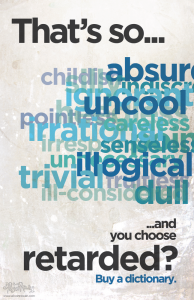by Helena Whitlow
When is it ok to use the word “retarded”? Well, I can tell you right now, it’s never. The word itself is so demeaning and derogatory, that it’s often spread around to describe something, or someone, who is beingdumb, absurd, illogical, childish etc. If you’re a Bostonian like I am, you hear that word being used A LOT. I was out to dinner with my younger brother and his friends, who are all in high school, andstill trying to navigate throughout the world. We were all having casual conversations, and one of my brother’s friends blurts out “THAT’S SO RETARDED!”Working in the field of autism, I got really upset and instantly replied back saying “that’s not a term to be thrown around you know?” He looked at me puzzled, confused, and thought I was being a “witch,” for lack of a better term. Using that word can really affect someone’s attitudes and actions, and cause pain to those around us. Unfortunately, we live in a world where the r-word is not just a clinical term, but a phrase. So, how can we spread the word, to end the word?
The word “retarded” is defined as “slow or limited intellectual or emotional development or academic progress” (“Retarded”, 2015). This term has been used for years in clinical practice in diagnosing an individual as “mentally retarded”, but as years go on, that phrase ensues a negative label. How did this word go from being a clinical term to slang? There’s an organization called “Spread the Word, to End the Word,” where people across the world can pledge their support to eliminating this derogatory term. The website uses the aspects of community psychology to help solve the problem, setting the standard that we as a geosystem, need to create more acceptance and better attitudes towards everyone with or without a disability. The organization utilizes foundational principles, and community and social change to address this issue, helping to create person-first language.
By referring to the competency of “Ethical, Reflective Practice,” community psychologists and “Spread the Word, to End the Word” organization strives for the continual ethical improvement for all. The effects of the r-word on people with disabilities is hurtful, and we want to show that everyone is capable of pursuing anything. People are coming together to improve the quality of life for people, utilizing the “Community Organizing and Community Advocacy” competency. The campaign focuses on spreading awareness on how language can affect someone’s overall wellbeing, in which as a community, we need to create more accepting attitudes (Scott & Wolfe, 2015, p. 44).
Let’s think of it this way, if somebody told you that you’re so stupid because you got a bad grade on your math homework, how would it make you feel? It would probably make you inflict negative feelings towards math, and you degrade yourself for even trying. Now, think of how the r-word feels to someone with a disability? We all want to feel accepting, and it should be like that for everyone, regardless of ability. So, what can you do to help spread the word, to end the word? Go to http://www.r-word.org/ ,pledge your support to eliminate the use of the word, and be part of the change that can affect the lives to those around us.
#commpsych #spreadthewordtoendtheword #equalityforall
Helena Whitlow is a graduate student in Autism Studies at the University of Massachusetts Lowell.
References
Retarded. (n.d.). Retrieved October 18, 2015, from http://www.merriam- webster.com/dictionary/retarded
Scott, V., Wolfe,S. (2015). Community Psychology: Foundations for practice. California: Sage Publications Inc.

